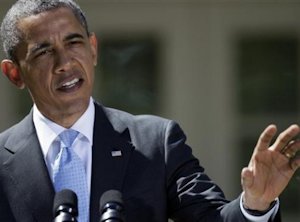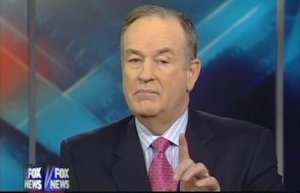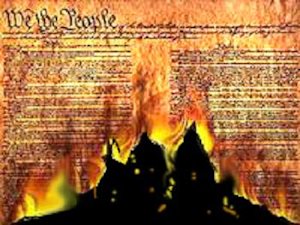The Most Untenable Position: Obama on the Supreme Court
 | | "Now let me be clear: if the Supreme Court agrees with me, then they are to be respected, but if they rule against me, they are obviously and hopelessly compromised partisan hacks who should be run out of town immediately" |
During a press conference yesterday, the president had his signature legislation, the Patient Protection and Affordable Care Act, on his mind. "I am confident," he said, "that the Supreme Court will not take what would be an unprecedented, extraordinary step of overturning a law that was passed by a strong majority of a democratically elected Congress." He added, "I'd just remind conservative commentators that, for years, what we have heard is, the biggest problem on the bench was judicial activism, or a lack of judicial restraint, that an unelected group of people would somehow overturn a duly constituted and passed law." This preemptive strike against the Supreme Court, because they might deem the law unconstitutional, is perhaps the most outrageous thing our president has said since taking office (and that's saying quite a lot).
First of all, there is nothing unprecedented at all about the Supreme Court overturning a law passed by a strong majority of Congress. Ever since Marbury v. Madison, it has been considered one of the Supreme Court's main duties to determine the constitutionality of existing law whenever there is concern that the law goes too far. The Supreme Court is supposed to be the last guardian of our constitutional foundations, and you'd think a constitutional scholar like our president would understand that. In fact, according to CBO numbers, as of 2002, the Supreme Court has overturned a grand total of one thousand three hundred fifteen laws. None may have been as high profile as PPACA, but how much a law appears in the papers has no relevance to its constitutionality.
Secondly, the law was not passed by a strong majority. It passed the Senate by a partisan 60-39 vote, and then it passed the House by a razor-thin majority of 219-212. Anybody who was paying attention knows that it was a nail-biter, only passing as the result of dozens of compromises and plenty of backroom political deal-making. To assert that the law was passed by a strong majority, as the president did yesterday, is to stretch the definition of "strong majority" well beyond the breaking point. If we can't call it a flat-out lie, we can at least call it a gross abuse of the facts.
 | | Sure, they may look impressive, but they're not as respectable as those elected leaders in Congress, who are clearly above reproach |
Thirdly, the size of the majority is irrelevant if the law is unconstitutional. Even if PPACA had passed unanimously, it would make no legal difference and should have no bearing on the Supreme Court's deliberations. The law is either constitutional or it is not; how it became a law is completely beside the point. If one day Congress passed a law that restricted the free speech of U.S. citizens in direct violation of the First Amendment, one would certainly hope that the Supreme Court would reject it, no matter how many Congressmen signed on to it.
Fourth, there is a reason the Supreme Court is not democratically elected. They are supposed to be dispassionate protectors of freedom, and if they were made accountable to public opinion as easily as presidents and Senators, it would taint their objectivity. Yes, they need to be accountable, but if they came into office on the heels of an election cycle, they would already be too compromised to be truly dispassionate. Now you can certainly make the case that the current process of having justices hand-picked by the executive branch and "vetted" by the legislative is imperfect and has resulted in a partisan court, but to imply that the court is less reliable than "a democratically elected Congress" is to be incredibly dubious. Besides, it's not like the public has so much faith in the Congress that they will see it as more honorable than the Supreme Court.
Fifth, what conservative commentators have been saying is, again, irrelevant. This has been a common tactic of this administration, to argue that the Republicans should be behind everything it does because they sort-of agreed with aspects of what it's doing once in the past. I am so tired of this argument, because it is a complete non sequitur; it does not matter. Besides, if it were completely true, that would mean that the president now agrees with conservatives, something we know he does not. The fact remains, however, that it is not true. Conservative commentators have been arguing against "legislating from the bench," from judges who are essentially trying to create new laws. Overturning laws--in essence pruning the size of government--is a conservative act. At the end of the day, however, it does not matter. Does the president really believe that conservative commentators should have any impact on the Supreme Court or that they are somehow going to start agreeing with the president just because he makes a snide remark about them?
 | | "You know what, Mr. President? You're totally right, and I apologize for how unreasonable I've been to you lately." |
Beyond these factual and logical problems with what the president is arguing, there is the question of political strategy. What is the president hoping to accomplish by taking this bold swipe at another branch of government? Is he trying to intimidate the Supreme Court? If he assumes that the Supreme Court could be persuaded to swing one way or another, why would he be openly hostile to them? It's like yelling at somebody who is preparing your food, and if the president's speech winds up having any impact on the justices, it is certain to be against him now.
Is he preparing an election-year strategy in the event that his signature accomplishment is struck down? Does he think that running against the Supreme Court is going to get him re-elected? Look, I can see how an overturned PPACA could energize his base and help him stay in the White House for another four years, but if he puts himself in a position of being an avowed enemy of constitutional checks and balances, he will completely alienate the independents and bring life back to the Tea Party. It would be a gift to the Republicans, because they could make the case that the president not only wants to institute unconstitutional laws but that he wants to subvert the constitutional construction of the United States government, and they would be right.
What's worse is that this spoiled brat routine won't help him if the law is upheld. It will only make him look petty and paranoid instead of confident and presidential. And if PPACA is upheld, Obama is going to need as much political capital as he can get his hands on to get re-elected, because nothing will energize conservatives more than a desire to repeal Obamacare. If they can believeably paint him as a whiny, insecure partisan, it won't help him get the crucial independent vote.
 | | "Of course I'm for burning the Constitution, but so were the Republicans a few years ago, so I don't see what the big deal is" may not be the best campaign slogan |
With that in mind, let's look at public opinion, because more people think the law should be overturned than think it should be upheld. Therefore, if the Supreme Court deems PPACA unconstitutional, the public is less likely to accept the premise of a hopelessly compromised Supreme Court than they would be if the Supreme Court upholds it. The public will not respond in the president's favor if he starts acting like a chided adolescent because an "unelected group of people" had the gall to stand in his way. Remember, regardless of whether PPACA is constitutional or a good idea, it is still unpopular.
A tactful president in Obama's position would be more moderate in his tone, and he would make the case that an overturned PPACA is evidence that he needs to remain in office not only so he can enact something better but so that the next justice isn't appointed by a conservative. It can be done without making yourself out to be an opponent of the separation of powers and an enemy of the United States Constitution, but President Obama doesn't seem to care.
I can only conclude, then, that the president is simply mad and unable to restrain himself from attacking the Supreme Court, that yesterday's press conference was simply tactless. There is no way it makes sense in any other context, because he is on the wrong side of the facts, on the wrong side of logic, on the wrong side of public opinion, and on the wrong side of the political calculus. What I'm trying to say is that President Obama is, in a word, wrong.
-e. magill 4/3/2012
|
|